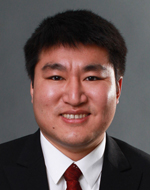 Earlier this year, JI Assistant Professor Wenjie Wan was awarded one of the top academic research awards given to young scientists in China, namely the “Youth 1000-People Program.”
Earlier this year, JI Assistant Professor Wenjie Wan was awarded one of the top academic research awards given to young scientists in China, namely the “Youth 1000-People Program.”
The Chinese government launched the “Youth 1000-People Program” in 2011 as the youth version of the “One Thousand Scholars Program”, which aims to recruit top-notch overseas talents with leadership and advancement potential in the science and technology field to come back to work in China.
The candidates for the “Youth 1000-People Program” must be under 40 years old and go through very competitive review processes such as peer review and interview. Professor Wan comments, “I feel lucky to come back to my home country at the right time as the country can support my research through such a nice program. My research focuses on optics. I am interested in socalled nonlinear optics at the nano-scale. One nanometer is 10000 times smaller than a human hair’s diameter. With the grant, I plan to purchase more equipment such as laser and microscopes. “
One month after Professor Wan won the “Youth 1000-People Program” award, he received another top academic research honor: his postdoctoral research project at Yale University, Coherent Perfect Absorber, has been selected by the Chinese Academy of Sciences and the Chinese Academy of Engineering as one of the “World’s Top Ten Technological Progresses in 2011” which include England’s techniques for preparing ultra-thin nano-film, the first cross-country flight of the largest solar-powered aircraft, the successful ‘grasp’ of the antimatter atoms for up to 1000 seconds, the U.S. development of the world’s first biological laser, the U.S. Mars Curiosity rover launch, the quantum information storage of the entangled state of the crystal, the completion of sequencing the potato genome, Japan’s development of the fastest computer, the Netherland’s creation of the world’s smallest molecular “electric car”.
Professor Wan describes his Coherent Perfect Absorber as “a device which can absorb 99% of the incoming light/laser. Laser emits the light; Coherent Perfect Absorber happens to be the exact opposite, which absorbs the light. Hence it could be a very useful device for making an optical computer and sensitive bio-sensor.” Professor Wan remarks, “Winning the Top Ten Tech is beyond my expectation, but it is one of the ways to recognize my previous works.” He published his invention as the first author in a recent issue of the Science.
As to what contributes to winning both honors, Professor Wan answers, “The quality of the work, itself, is the key. “





